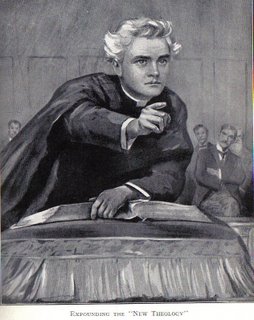The Decline of Welsh Nonconformity 9: Politics and 'The New Theology.'

However, for many in the churches, political and social involvement under the auspices of Christianity prepared the way for an ideology that looked for the realization of God’s kingdom on earth through political action, in other words, Socialism.[1] Keir Hardie liked to declare that socialism was the realization of the Kingdom of God preached by Jesus,[2] echoing the words of R. J. Campbell (pictured), controversial minister of the City Temple, London, who declared: 'Our business is to show that the religion of Jesus is primarily a gospel for this life and only secondarily for the life to come.'[3] Jones notes that, in order to make such a statement, Hardie had had to distort the message contained in the Bible, something made easier by the new doubt in theology. Indeed, Hardie’s ideas owed a great deal to the ‘New Theology’ of R.J Campbell, a modified pantheism that saw sin as merely error and Christ as an enlightened man and example, as well as stressing social action.[4] For men like David Thomas, Chapel doctrine, so muddy and confused, became pointless, to be replaced by red-blooded socialist doctrine. If Christianity seemed to be in conflict with socialism, the message of the Gospels had to be changed, not the message of socialism.[5] And, slowly, God could even be written out of the picture, replaced by the message of Karl Marx.
[1] Robert Pope: Building Jerusalem: Nonconformity, Labour and the Social Question in Wales 1906-1939 (Cardiff, 1998) p.83-85; R.J Campbell, The New Theology (London, 1907): Pantheistic conception of God pp.18-21; Christ a man who ‘was divine simply and solely because His life was never governed by any other principle’ save love, pp.75-7. Sin human error in seeking after God, pp.160-2: The man who got drunk last night […] would be surprised if you were to tell him […] that he seeking God; but so it is.’[2] In fact it appears that Keir Hardie was more interested in Spiritualism, Palmistry and astrology than orthodox Christianity. However, his appropriation of religious language allowed him to speak to the workers in a langauge they understood (Robert Pope, Jerusalem, p.9).
[3] R. J. Campbell, The New Theology, p.256. He also declared: ‘In fact, the Labour Party is itself a Church, in the sense in which that words was originally used, for it represents the getting together of those who want to bring about the Kingdom of God [R.J Campbell, The New Theology (London, 1907), p.255].'
[4] Pope: Jerusalem, p.14-15.
[5] Jones: Faith, p.410.
Labels: Deline of Welsh Nonconformity

0 Comments:
Post a Comment
<< Home